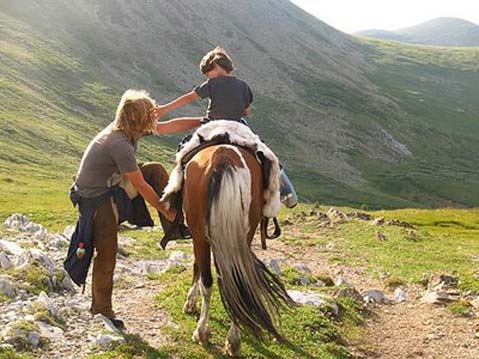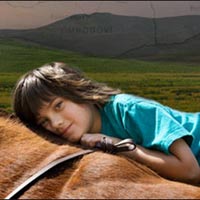Autism Attacked Alternatively
What Parents and Society Should Learn from The Horse Boy

Though no one knows exactly why, it’s pretty clear that more kids are being diagnosed with autism these days than ever before. The developmental disorder – which impairs social interactions, leads to repetitive behavior, and results in seemingly senseless tantrums – manifests itself in myriad ways, with severity ranging from fully functional to nearly catatonic. But while the disease certainly troubles the afflicted, the parents of an autistic child must shoulder an equally challenging burden.

That’s what journalist Rupert Isaacson learned when he and his wife, Kristin, realized their son Rowan had autism, and began to confront his symptoms-inability to make friends, peculiar play habits, incontinence, tantrums – with as many methods as possible. One day, after years of being kept away from the horses that surround their Texas home, Rowan snuck out and found his muse in a horse named Betsy, who seemed to bring the boy a rare sense of comfort and joy. But Rowan’s problems progressed, so Rupert sought out alternative therapies, and eventually convinced the family to head to Mongolia, where they would ride the steppe on horseback in search of shamans who could treat the disease. It’s hard to believe that the outlandish scheme – which is the subject of the thought-provoking and uplifting documentary The Horse Boy – actually paid off, but today Rowan is a much more independent and happy.
Rupert Isaacson recently spent a few minutes chatting about the experience in anticipation of the film’s screening next week at UCSB’s Campbell Hall.
How is Rowan now now? He’s doing incredibly well. He’s two grades ahead academically, and that’s something we never thought we’d see. He’s still autistic, but it’s as if the dysfunction that came along with his autism went away. He has a ton of friends and most of them are: for want of a better word, normal. He doesn’t have problems making friends.
How much of his recovery do you think was due to the trip to Mongolia? He was subject to these terrible dysfunctions before we left, and when we came back he didn’t have them – the incontinence, the tantrumming, not being able to make friends. Those dysfunctions disappeared either during or right after those ceremonies.
Do you credit the ceremonies with fixing Rowan? I think that the shamans, if you go to the place where they’re working at the village level, they are very good at what they do. They didn’t cure him of his autism, but they certainly seemed to ameliorate his symptoms to the extent that his autism is no longer an issue. But remember, we never abandoned Western therapies.
Do you recommend vision quests for other autistic kids? What I’d recommend is that you follow the interests of the child. I was trying to keep Rowan away from horses and he took himself to the horses. So for Rowan, it was nature and animals, but for another child it could be something else. Follow that and you’ll get good results. Nature also definitely helps to calm down over-stimulated nervous systems, so doing therapies in nature might get a better response.
Do you see the West embracing more alternative therapies? I think so. The parents do it first and then the establishment buys in, rather than the other way around. Parents will try pretty much anything that they see working for another parent, and all the best information comes from other parents. Most of the information that comes from professionals tends to be conflicting:. Parents are willing to get creative:
Science and the establishment are scrambling to catch up with this pandemic of autism. There’s a limit on how much they can know. Thanks to the interaction between parents and the scientific establishment, we’ll understand a lot more about it 30 years from now. Parents are being very creative and embracing such things as nature, not because they’re taking a philosophical position but because it gets results.
Did the Mongolians understand what autism is? They’re quite savvy about it. They might have a different way of expressing it, saying that his mind has not yet come together. Their diagnoses are often close to Western diagnoses. For example, when they are saying “ancestor spirits,” you first think, “Oh gosh, that’s way out there.” But if you think about it again, it’s a metaphor for genetics. When they say something like “black energy entered the womb,” you first think “how outlandish.” But we know there is a strong connection with environmental toxins – Rowan has been treated for heavy metals, and his levels were very high, and that is common in autistic kids. Suddenly you realize and understand that it’s slightly different language, but in a way that two different sets of professionals are looking at the same thing. It’s not really miles and miles away from each other. Also, they’re whole attitude toward autism is different – they regard it as a qualification for a job, not a disqualification from society.
Your film reveals that what Americans might call a disability can actually be seen positively by other cultures. Do you see that understanding growing in the West? More and more. One of the difficulties is, what does one mean when talking about Western society? Western society is quite polarized. Are we talking about Dick Cheney and the Christian right, or educated liberals? Across the board, I sense that we are seeing a shift. One of the interesting things is that quite a lot of the positive reactions have come from Christians, and this has surprised me. I thought they would be quite dismissive of these things, but actually, most of the hypnotherapy and equine therapy are run by Christians. I think that they don’t have a problem with the idea of the irrational complementing the rational, even if their idea of irrational might be very specific. This is not the rabid end, but the more educated middle.
Ironically, some of our most damning criticisms are from people within the educated liberal community. I didn’t expect that – them saying this is all mumbo jumbo, that we’re giving false hope, that we’re exploiting our child. I was quite surprised by that.
My response is: You guys clearly aren’t autistic parents. If you get a good result, you want people to make it public, even if you don’t use every aspect of it. If someone finds a successful therapy, I want to know about it.
4•1•1
The Horse Boy screens at UCSB’s Campbell Hall on Tuesday, November 24 at 7:30 p.m. Call 893-3535 for tickets. For more info, visit horseboyfoundation.org.



